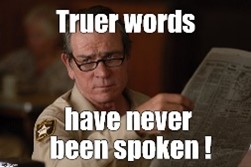Are you looking for a confirmation statement to let someone know you fully agree with their views or claims? If so, you could use "truer words have never been spoken" to let them know you are on board with what they are saying. This post unpacks this expression's meaning and origin.
Meaning
The expression "truer words have never been spoken" means that you agree with what someone has to say. The person could be speaking to your directly or addressing a crowd. It's a way of telling someone that you fully agree with them and have the same thoughts and ideologies.
The phrase has a political background to its origin. As a result, it's more common to hear people use the term when they are addressing socio-economic or political concerns. The phrase has a formal and somewhat serious overtone to it. Therefore, it suits situations where what you agree with has a large impact on society.
You're more likely to use this expression in a formal conversation at work than at home. However, if you're discussing a serious topic with your partner and want to show them the deepest level of agreement possible, "truer words were never spoken" is a great confirmation statement.
Example Usage
“Thomas came over for dinner and loved my wife’s cooking. He said I was lucky to have such a good cook as a partner. I told him truer words were never spoken.”
“The prophet said these events would happen during the end times. If you think about it, truer words were never spoken.”
“I feel you about the way we need to do something about the homeless situation in LA. Truer words were never spoken.”
“Kim said that climate change will lead to a massive global famine. From the shortages we’re seeing, I guess truer words were never spoken.”
“I understand what you mean about the people going crazy right now. It’s all to do with socio-economic policies. Truer words were never spoken.”
“The president said we need to stop the war if we want to get inflation under control. Truer words have never been spoken.”


Origin
The origin of the expression "truer words have never been spoken" comes from politician M.E Grant Duffy, an English MP.
Grant coined the expression in 1878, not long after the American civil war. The MP was a foreign policy consultant to Downing Street and participated in debates overlapping British/ Russian events in the Asian region.
When an MP spoke of their concerns over the growing potential for armed conflict between Russia and the UK, Duff agreed with the statement, using "truer words have never been spoken" to confirm the MP's concerns.
Phrases Similar to Truer Words have Never been Spoken
- You hit the nail on the head.
- You read my mind.
- My thoughts exactly.
Phrases Opposite to Truer Words have Never been Spoken
- I don’t agree.
- That’s never going to happen.
What is the Correct Saying?
- Truer words have never been spoken.
Ways People May Say Truer Words have Never been Spoken Incorrectly
The phrase suits use as a confirmation statement, letting the speaker know that you are in full agreement with them. Using it as a way to tell someone that they’re wrong is incorrect.
Acceptable Ways to Phrase Truer Words have Never been Spoken
You can use the expression, “truer words have never been spoken” as a statement of agreement. It’s a similar expression to “hear, hear” in that its somewhat formal and has a serious overtone to it. You can use the phrase in professional and social conversations to tell the other person that you are in full agreement with them.
You could use it at home if your partner tells you that you need to think about losing weight and getting back on a diet. Or you could use it at work when your boss tells you that you need to implement a CRM system to stop the company from losing customers.